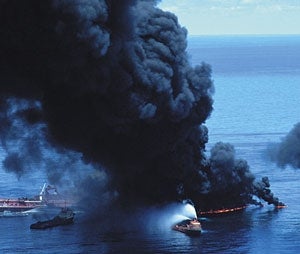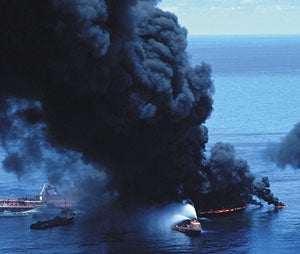HOUSTON, TX—The 1,080-foot, 300,000-ton oil tanker Shell Global Explorer, which sank off the coast of Newfoundland last month, will provide a welcome habitat for many diverse species of endangered marine life, Shell Oil Company executives announced with a straight face Tuesday.

“In its new resting place, far beneath the surface of the North Atlantic, the Global Explorer is host to countless fish and an infinite variety of marine vegetation,” a press release from Shell read without a trace of irony. “A ship that once helped run life above the waves now houses life beneath them.”
The reading of the press release preceded public statements from Shell executives.
“We in the petroleum industry have long believed that we have a responsibility to protect and conserve the environment in our daily business operations,” said Shell CEO Steven L. Miller to reporters in the face of all available evidence. “We view this commitment to projects that will conserve and protect the marine ecosystem as an important investment in our future.”
“At Shell, we’re proud to provide a niche for the struggling denizens of our oceans,” said Shell vice-president of international shipping Dennis Gallsworthy, who apparently intended his words to be taken seriously.
Somehow maintaining his composure despite being able to hear the things he was saying, Gallsworthy added, “We have a strong commitment to protecting and preserving sea life.”
On Sept. 27, radio messages from the tanker indicated it had suffered extensive damage to its hull following an explosion, which pierced its overloaded crude-oil tanks. By the time the ship slid to the bottom, Shell public-relations officials were touting its potential as an artificial habitat, often while looking straight into reporters’ eyes.
“The many species of fish native to Newfoundland’s Grand Banks have in recent years increasingly struggled to find feeding and breeding grounds,” Miller said, as if Shell were deeply concerned with these circumstances and not, in fact, partially at fault for them. “We must take all available steps to help reestablish these species in their native waters.”
Hoping to both deflect blame and take an opportunity for self-promotion, Miller took aim at the commercial fishing industry without so much as a smirk.
“The Global Explorer’s new resting place will provide shelter for countless threatened, often over-harvested fish,” he said. “At Shell, we’re proud to use our multibillion-dollar, globe-spanning resources to aid a worthy environmental cause.”
Not all press reaction has been positive.
“Once again, Shell has demonstrated its unique brand of environmentalism, this time to the life of our planet’s oceans,” Mother Jones environmental reporter Neil Taylor said Tuesday. “The sunken hulk of the Shell Global Explorer, which hauled billions of gallons of crude oil during its operational lifetime, will have an impact on aquatic life for hundreds of years to come.”
Shell reacted quickly to these and other statements, working with mainstream news sources to tell its side of the story.
“Once again, Shell has demonstrated its unique brand of environmentalism, this time to the life of our planet’s oceans,” read a full-page ad from Shell that will appear in Wednesday’s edition of USA Today. “The sunken hulk of the Shell Global Explorer, which hauled billions of gallons of crude oil during its operational lifetime, will have an impact on aquatic life for hundreds of years to come.”
“We’re proud of what we’ve done for the planet,” Miller said, possibly truthfully. “And believe me when I say that at Shell, we’re committed to changing our world forever.”







